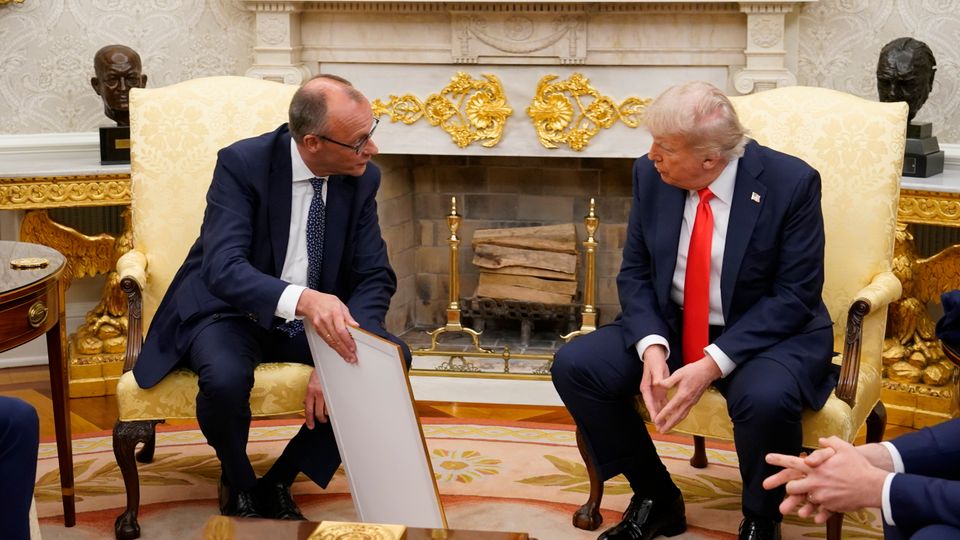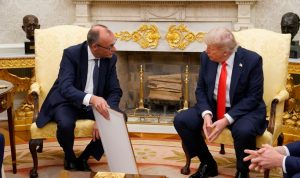Merz presented Trump with a framed copy of his grandfather's birth certificate.
It is well known that German Chancellor Friedrich Merz isn’t particularly fond of his predecessor Angela Merkel. Merz and Merkel: It is the story of a long rivalry – a saga that perhaps even Donald Trump is aware of. The U.S. president, in any case, seemed intent on badmouthing Merkel with Merz during the German chancellor’s visit to the Oval Office on Thursday afternoon. Few things, after all, are more unifying than a common enemy.
Trump alleged that Merkel is to blame for the fact that "bad people” can be found in Germany as well, a reference to Merkel’s migration policies. He also complained that she continued to back the Nord Stream 2 natural gas pipeline even though he warned her that it was a bad deal with Russia.
The article you are reading originally appeared in German in issue 24/2025 (June 7th, 2025) of DER SPIEGEL.
What did Merz do? Did he agree with Trump? Did he give in to the temptation? He did not. Aside from a slight nod and a rather tortured smile, he refrained to stoop to the level of the U.S. president.
Merz has been the German chancellor for only a month, but he has nevertheless taken number of trips abroad during that time. But the visit to Washington was by far the most important of the bunch.
There was a lot at stake on Thursday for Merz’s first trip to Washington as German chancellor, including such vital issues as European security and prosperity. Trump represents a threat to both of them. The U.S. president is seeking closer ties with Russia’s authoritarian ruler Vladimir Putin and has also threatened Europe with painful tariffs. Trump is not a fan of a unified West, and he also seems to be unconcerned about the trans-Atlantic relationship falling apart. Will Merz be able to convince Trump to abandon his destructive ways?
There was a lot at stake on Thursday for Merz as well. He clearly wants to be known as a foreign policy chancellor. He is hoping to unify Europeans and boost Europe’s defenses – and he also wants to be a leading voice on the Continent. During his visit with Trump in Washington, Merz provided a first glimpse as to whether he will be able to stand up to the biggest egos of global politics. It was a first test. And Merz passed.
The chancellor is concerned about the fate of Ukraine and has spent the past several weeks deploying the instruments of diplomacy in an effort to get Russia to agree to a ceasefire. He hasn’t made much progress, but in Trump’s office, he took another stab at it.
Merz flattered the U.S. president, telling Trump that he holds the keys to the end of the war in his hands if he only decides to ratchet up the pressure on Putin. Trump, though, grew evasive and began blathering about how this war is like two children bickering, saying you have to let them bicker until they have enough of it. Merz didn’t contradict him directly, but he said clearly where Germany stands: at Ukraine’s side. A bemused look crept onto Trump’s face but he let his German visitor’s statement stand.
Merz has introduced a new tone into German foreign policy, having issued several sharp condemnations of the U.S. government. During the German election campaign, U.S. Vice President JD Vance and the tech billionaire Elon Musk threw their support behind the far-right party Alternative for Germany (AfD), a bit of meddling that Merz said was "no less dramatic, drastic and ultimately shameless than the interventions we have seen from Moscow.” When Trump blamed Ukrainian President Volodymyr Zelenskyy for the war in his own country, Merz said it was a "classic reversal of the role of perpetrator and victim,” adding that he was "rather shocked” that Trump had made Putin’s narrative his own.
Friedrich Merz on German public broadcaster WDR
He recently even performed an imitation of Trump, essentially mocking him. During an appearance on the German public broadcaster WDR, Merz began speaking of his telephone conversations with the U.S. president, saying that during such calls, "small talk is important, as is not talking too much and letting him talk instead.” It is "very much about Trump” and every second or third word is "great,” Merz said. He seemed to be enjoying himself as he gossiped about his chats with Trump. Self-confidence? Or clumsy naivete with little thought for the consequences?
If Trump took any notice of Merz’s scorn, he didn’t let on. Instead, he flattered Merz, praised him for his election victory and his strength of leadership – but then, for large stretches of the press conference, Trump seemed to forget that Merz was sitting next to him at all. It was Trump’s show, and he held extensive monologues while Merz merely reclined in his gold-and-yellow upholstered armchair and did his best to keep his face as expressionless as possible.
By all accounts, Merz's trip to Washington was successful, primarily by virtue of the fact that it wasn't a disaster.
During the German election campaign, Merz spoke as though he had the secret for how best to deal with Trump. His priorities, he said at one point, are "America first, second and third.” Trump, Merz was fond of saying on the stump, is a dealmaker, and you just have to make him the right offer. The message was clear: Merz, a lawyer with many years of experience in the business world, is also a dealmaker.
In Washington, though, Merz’s great faith in his own abilities appeared not to be quite as pronounced. Merz exuded modesty, happy to keep a low profile. In the run-up to the visit to the White House, his staff had told him not to expect too much. Even just a reasonably friendly conversation with Trump, they said, would be a success.
Given Merz’s past, it was no doubt a difficult message to internalize. Born in 1955, Merz is part of a West German generation that has always admired America while looking to it for protection – perhaps not always likeable, but certainly reliable. The erosion of the trans-Atlantic relationship must be painful to him.
Merz is intimately familiar with the U.S. He has visited the country around 150 times during a career that has seen him work for the U.S.-based investment company BlackRock in addition to spending 10 years as the chairman of the Atlantik-Brücke, a lobbying association that campaigns for tight economic ties between the U.S. and Germany. Merz is a convinced trans-Atlanticist and his party, the Christian Democratic Union (CDU), has always stood for Germany putting down deep roots in the West. Like no other political force in Germany, the party stands for close relations between Germany and the U.S. Since Trump’s return to the White House, Merz is no doubt wondering what remains of this alliance. When he was asked not long ago whether Germany is "still in a values alliance with America,” Merz said: "I would love to answer yes, but that is becoming increasingly difficult.”
It was a rueful statement exuding a certain amount of bitterness – which might have to do with the fact that much of the hostility and many of the provocations coming from Trump and his entourage have been aimed at Merz.
When JD Vance said at the Munich Security Conference in February that there is "no room for fire walls” in a democracy, it was a clear shot at Merz and his party’s refusal to work together with the AfD. After the Office for the Protection of the Constitution (BfV), Germany’s domestic intelligence agency, which is also responsible for monitoring political extremism, recently classified the AfD as "certified right-wing extremist, U.S. Secretary of State Marco Rubio called Germany a "tyranny in disguise.” Which would make Merz a tyrant rather than a chancellor.
German Chancellor Friedrich Merz in the Oval Office with U.S. President Donald Trump, Secretary of State Marco Rubio and U.S. Vice President JD Vance.
During the meeting with Trump in the Oval Office, Vance and Rubio were also in the room. They remained silent, however, avoiding provocations on this occasion. Merz can book that as a win.
Indeed, there even seemed to be a certain degree of amiability between Trump and Merz. On one occasion, Trump touched the chancellor’s knee and called him "a good man to deal with, difficult to deal with,” intending it as a compliment. And there are clearly things they have in common. Like the U.S. president, Merz has achieved wealth in the private sector. He owns an airplane and he plays golf, things likely on the positive side of the ledger for Trump. The U.S. president invited the chancellor to spend the night in the Blair House the official presidential guest house, a gesture the Chancellery has interpreted as a good sign.
But those are all small things. Trump’s policies remain radical and they will be the determining factor of Merz’s tenure. That much became clear even before Merz was sworn in. When Merz suddenly flip-flopped after the elections and surprisingly decided to loosen Germany’s balanced budget rules to be able to vastly increase German defense spending, he justified it to his party’s lawmakers with the potentially looming American exit from NATO. That, it appears, is one of his foremost concerns. In his conversation with Trump, the chancellor emphasized that Germany is playing a larger role in the alliance than ever before. It was Merz’s way of doing his part to keep the Americans in NATO and prevent Trump from consistently called the mutual defense clause of the North Atlantic Treaty into question.
For Europe’s future, these are serious, existential questions. But for Trump, it is merely fodder for a joke. In talking about Germany spending more on defense, the U.S. president said: "Is that a good thing or a bad thing? I think it’s a good thing, at least to a certain point. There’ll be a point where I’ll say: 'Please don’t arm anymore,’” Trump said to laughter. Merz also chuckled at the joke.
Trump likes gifts, and the chancellor duly brought one along: a copy of his grandfather’s birth certificate from Kallstadt, in both German and English, written in old German script and framed in gold so that it matches well with Trump’s interior decorating tastes. The man’s name was Friedrich, like Merz. But was it a gift that pleased the president?
It was clearly another attempt by Merz to develop a bond with Trump, to reach him on an emotional level and win him over to the side of Germany and Europe. But Trump seemed unimpressed, as though he didn’t want to be reminded of his own family’s history immigration past. In their first telephone call, the two had talked about Trump’s grandfather, but perhaps Merz read too much into it. Maybe he failed to see just how complicated Trump’s relationship with Germany really is. For a time, Trump insisted that his family had immigrated to the U.S. from Sweden, likely for reasons of image. Later, he said he is proud of his German heritage, but he has also spoken incredibly disparagingly of Germany.
"The Germans are bad, very bad,” he complained during his first term in office. What he particularly didn’t like, and still doesn’t, is seeing German cars on American roads. "Look at the millions of cars they sell in the U.S. Terrible. We’ll stop that,” he said. Trump’s mega-tariffs, set to enter into force soon, would likely make that wish come true. Sitting with Merz in front of the TV cameras, he didn’t give the impression he was considering a change of plans.
Ich bin damit einverstanden, dass mir externe Inhalte angezeigt werden. Damit können personenbezogene Daten an Drittplattformen übermittelt werden.Mehr dazu in unserer Datenschutzerklärung.
Merz’s team in the Chancellery had been harboring the hope that this first meeting with Trump would lay the cornerstone for a more-or-less functional relationship. And the chancellor appears to have achieved that goal. Trump seems to respect him. Whether that will have real-life consequences when it comes to the tariff war or support for Ukraine remains to be seen. Perhaps sooner rather than later. Trump and Merz will see each other again in mid-June at the G-7 summit in Canada, and then again at the end of the month at the NATO summit in The Hague.
Back in the Oval Office, Trump was asked if Putin is a friend of his. "I’m not friends with anybody,” Trump responded. Before then turning to Merz and saying: "I’m friends with you.” The president and his entourage laughed. As if this, too, was a joke.







